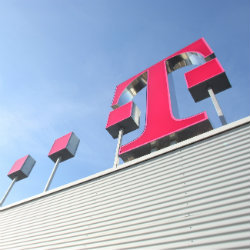
T-Mobile confirmed to Light Reading that it had rolled out 5G network equipment in 30 cities, as it promised to do last year. However, the company is not yet offering commercial services on the new network because it is waiting for 5G smartphones to become available.
The operator confirmed the news in response to questions from Light Reading about its pledge early last year to introduce 5G services in 30 cities in the US by the end of 2018, including New York, Los Angeles, Las Vegas and Dallas. During an event at last year's Mobile World Congress trade show in Barcelona, Spain, the operator's CTO said T-Mobile would split the rollout equally between vendors Ericsson and Nokia and would deploy services on its 600MHz, 28GHz and 39GHz frequencies. (See T-Mobile to Roll Out 5G in 30 US Cities in 2018.)
In his comments in February 2018, T-Mobile's Neville Ray made it clear that the carrier would have the network up and running by the end of 2018, but that the operator likely wouldn't offer commercial services on the network until early 2019, when compatible smartphones became available.
T-Mobile did not provide details on its 5G deployment progress in those 30 cities. Therefore, it's difficult to assess whether those efforts involve just one or two cell sites or sites that span a full city.
Thus, T-Mobile essentially built a 5G house but isn't providing anyone with keys for entering. It's also not clear whether the house has walls or a roof yet.
T-Mobile has promised to roll out 5G nationwide on its 600MHz spectrum by 2020. (See T-Mobile Promises 'Nationwide' 5G in 2020 With New Spectrum.)
T-Mobile's 5G launch timeline aligns relatively closely to those from its rivals including AT&T and Verizon. AT&T, for example, late last year launched mobile 5G service in parts of 12 cities. However, that service is only available to select customers and lacks many of the particulars -- such as network usage stipulations and detailed pricing information -- that a typical telco service launch would include. The service is also is only available through Netgear's Nighthawk 5G Mobile Hotspot, which T-Mobile CEO John Legere has derided because it's a puck and not a smartphone. (See AT&T's 5G Switches On in 12 US Cities, but Only for 'Early Adopters'.)
AT&T has promised to offer mobile 5G smartphones in the coming months. Sprint and Verizon too have promised mobile 5G launches with smartphones in the coming months. Specific launch dates remain vague.
At issue are the chipsets that smartphone vendors need to build 5G their devices. Those chipsets, developed by the likes of Qualcomm and Intel, were rushed into production shortly after the wireless industry's 3GPP standards group approved the initial hardware specifications for 5G, but no handset vendor has yet been able to obtain chips and then build them into a commercial 5G smartphone. However, smartphone vendors ranging from Huawei to LG to Samsung have promised to launch 5G smartphones in the coming months. Again, specific launch dates remain vague.
Interestingly, T-Mobile's progress on the 5G front was on display at last week's Consumer Electronics Show in Las Vegas. The company showed off its previously announced "tech truck" that has been touring the country in part to show off the potential of 5G technology. At its CES tech truck, T-Mobile showed off live 5G transmissions using Ericsson and Intel equipment on its 600MHz and 39GHz spectrum. Importantly, the operator's demonstration did not provide any details about the speeds available through the service.
T-Mobile isn't the only carrier remaining silent on 5G speeds. AT&T has not provided any performance details on the mobile 5G service it launched late last year in parts of a dozen cities. Verizon, though, has promised that its 5G Home customers -- those who subscribe to its fixed wireless internet service launched in October on its 28 GHz spectrum -- should expect consistent speeds of 300 Mbps and bursts up to 1 Gbps. (See Verizon's Home-Grown 5G Arrives Today.)
T-Mobile's 5G plans are noteworthy because the operator is the only major wireless network provider that is planning to launch 5G services on 600MHz spectrum. Such a low-band spectrum is ideal for long-range transmissions, but it cannot carry the same amount of data that transmissions in the high-band spectrum like 28GHz and 39GHz can. Conversely, due to the propagation characteristics of a millimeter-wave spectrum, transmissions 28GHz and 39GHz will be able to handle enormous amounts of data but won't be able to travel more than a few thousand feet, and also won't be able to penetrate buildings and other structures.
— Mike Dano, Editorial Director, 5G & Mobile Strategies, Light Reading
About the Author(s)
You May Also Like




_International_Software_Products.jpeg?width=300&auto=webp&quality=80&disable=upscale)







